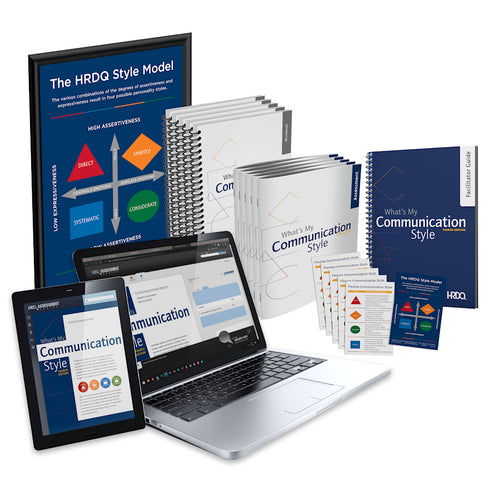Share
8 Excellent Examples of Conscientiousness in the Workplace
Bradford R. GlaserConscientiousness is a highly sought-after personality trait in organizations, as it can include valuable qualities such as dependability, organization, and thoroughness.
Conscientious people are hard workers who orient themselves around goals and achievements. Able to handle complex tasks while staying organized, these employees and leaders tend to be reliable and ambitious.
On the other hand, conscientious professionals can struggle with inflexibility and perfectionism in the workplace. While it is an incredibly valuable trait in many regards, it can also mean that a worker is overly rigid and less able to develop creative solutions.
What does conscientiousness look like in the workplace? Let's look at eight excellent examples .

- Discover your personal style
- Recognize communication growth spots
- Flex your style to communicate with anyone
Table of Contents
- What Is Conscientiousness?
- What Does Conscientiousness Look Like in the Workplace?
- What Are the Benefits of Conscientiousness in the Workplace?
- What Are the Drawbacks of Conscientiousness in the Workplace?
- 8 Examples of Conscientiousness in the Workplace
- 1. Being on Time
- 2. Setting Realistic Goals
- 3. Going the Extra Mile
- 4. Building Strong Relationships With Colleagues
- 5. Having an Organized Schedule and Workspace
- 6. Being True to Your Word
- 7. Having a Strong Sense of Professional Ethics
- 8. Planning Ahead
- Cultivating Positive Traits in the Workplace
What Is Conscientiousness?
Considered one of the Big Five personality traits (along with openness, extraversion, neuroticism, and agreeableness), conscientiousness relates to an individual's awareness.
When a person is conscientious, it means that they are highly thoughtful, goal-directed, and have good impulse control. These individuals follow rules and keep commitments, work diligently, and are mindful of details and are organized.

An employee or leader who is conscientious is aware of how their behavior impacts other people, considerate of deadlines, and willing to plan.
Individuals with less conscientiousness are less organized and less structured. As a result, they might be more likely to procrastinate when faced with a task and miss important deadlines. On the other hand, they also tend to be more comfortable with change and less tied to strict routines.
What Does Conscientiousness Look Like in the Workplace?
Now that we understand what conscientiousness means as a personality trait within the Big Five model, let's look at what it might mean for a professional to be highly conscientious.
1. Dependability
Conscientious professionals are highly reliable, which means that company leaders, team members, and employees can trust them to help whenever possible.

Conscientious people follow through on promises, whether it's meeting a deadline or showing up on time. As a result, conscientious workers might be more likely to advance within a company.
2. Thoroughness
An individual who is conscientious in the workplace values quality over quantity and works with a detail-oriented mindset. Whenever they work on a project, they explore all potential possibilities rather than simply taking the first route that comes to mind.

Conscientious professionals are often the best fit for roles requiring precision and quality.
3. Organization
When a worker is highly conscientious, it means that their schedule and workplace are organized and tidy. This means that they usually good at time management, able to plan schedules, meet deadlines, and avoid last-minute chaos. This organization helps them focus on what really matters.

This quality is valuable for any team member, as it helps promote a sense of order within the organization.
4. Emotional Intelligence
Conscientious people usually have a heightened awareness of the reactions of other individuals during conversations compared to people who are low in conscientiousness.

In addition, they have well-developed emotional intelligence skills, such as communication, self-awareness, empathy, etc., which are valuable in any workplace or industry.
5. Commitment
Conscientious people tend to dedicate themselves to their plans, meaning they will put in extra time and energy to complete tasks.

This level of dedication, determination, and commitment can be incredibly valuable to coworkers and the organization.
What Are the Benefits of Conscientiousness in the Workplace?
There are numerous appealing benefits of conscientiousness as a prevalent trait in your workplace, including the fact that conscientiousness is linked with better health. One of the theories behind why this might be the case is that people who score highly in conscientiousness are less likely to engage in high-risk health behaviors.
Studies have also found that conscientious people tend to get better grades in school, earn a higher income, and enjoy more job satisfaction in their careers.

From an employer's standpoint, conscientious employees are valuable because they can be trusted with important tasks and are thoughtful about the consequences of their decisions. This latter point means they can develop helpful problem-solving and critical thinking skills and incorporate them into their work.
What Are the Drawbacks of Conscientiousness in the Workplace?
While having conscientious employees sounds like a no-lose situation, there are always two sides to every coin. Conscientious people tend to be highly structured, which can also mean they struggle with change and adaptability. They can also come off as overly serious, so an office filled with people who rank high in conscientiousness can mean a company culture that is heavy.

Conscientiousness, like the other Big Five personality traits, is a spectrum. In the most extreme cases, very conscientious people can sometimes struggle with obsessive-compulsive disorder or perfectionism.
Even though people with lower levels of conscientiousness might be less predictable and reliable, they also tend to be more flexible and able to think creatively. For this reason, many workplaces can benefit from employing people with various personality traits. While a conscientious person might be well-suited to routine tasks and business-as-usual, less conscientious people are often better able to step outside the box and pivot at the drop of a hat.
8 Examples of Conscientiousness in the Workplace
What does it look like for an employee or leader to be conscientious in the workplace? Here are eight classic examples to help you identify conscientious team members while cultivating conscientiousness in your professional career.
1. Being on Time
A highly conscientious person is consistently on time. That is true whether they're showing up for a regular day at the office, an important meeting with a client, or turning in a project by the deadline.

An example of an employee being conscientious in relation to time might involve setting reminders for their calendar events and breaking projects into smaller tasks so they can chip away at them in a measured way leading up to the due date.
Less conscientious people might try to be on time for work but frequently show up late because they don't plan for unexpected events. A more conscientious person will build buffer time into their schedule to ensure they will be on time even if they get caught in traffic. They will also allow extra time between meetings so they will still be on schedule, even if one runs later than expected.
2. Setting Realistic Goals
Conscientious people are goal-oriented, meaning they always have clear and well-defined goals they are working towards in their work.

These goals aren't lofty or unreasonable, though – a highly conscientious person sets goals they know they can obtain if they create a schedule and stick to it.
3. Going the Extra Mile
If you have a colleague or employee who seems to always go the extra mile on their projects, you might be looking at a person who is high in conscientiousness. That is because conscientious people focus on producing high-quality work. They value hard work and are incredibly attentive to details.

Because of their strong sense of professional ethics (which we'll discuss later) and their focus on producing the best work, you can count on the fact that conscientious people are much less likely to cut corners. They might end up putting more hours into a project than some of their coworkers, but they'll still get it done by the deadline because they are highly organized and prone to planning ahead.
4. Building Strong Relationships With Colleagues
Self-management is a critical component of emotional intelligence, and conscientiousness is considered one of the elements of self-management. That means conscientious employees are frequently brimming with emotional intelligence, which is the ability to manage and understand your own emotions and the emotions of the people around you.

A person who can build strong relationships with coworkers, colleagues, company leadership, and employees probably ranks high on conscientiousness. That is because they usually have an increased awareness of how people react during the conversation and are better able to relate to others than less conscientious people.
5. Having an Organized Schedule and Workspace
A highly conscientious worker will have an up-to-date calendar full of important meetings and deadlines. They'll create a to-do list every day or every week with their goals for the day and essential tasks. They will outline what they need to do each day, set an allotted amount of time for each item, and stick to their schedule.
On top of having an organized schedule, their workspace will also be neat and tidy. The desktop on their computer is thoughtfully organized, using folders and allowing access to the most important documents, while their desk is free from clutter or distractions.

On the other hand, a person with low conscientiousness doesn't like making and keeping schedules and tends not to like structure in general. They are much more likely to use items and leave them where they don't belong, not take care of their material possession or workspace, and leave a mess in the office.
Considering that our physical work environment can significantly impact how we work, it's clear that some level of conscientiousness in the workplace can benefit the individual and the team in this regard.
6. Being True to Your Word
Reliability is one trait of being conscientious, which means that conscientious employees always do what they say they will do. They practice self-management to fulfill their commitments and communicate with their coworkers and leaders to ensure that each project is completed with a consistent quality level.

Someone who doesn't score very high on the conscientiousness scale might be more likely to agree to things they won't follow through with and leave essential tasks to the last minute. Because they tend to be less reliable, coworkers and managers learn that these employees might not be as trustworthy, even if they are well-intentioned. They simply don't have the organizational skills or internal sense of professional ethics to stay true to their word.
7. Having a Strong Sense of Professional Ethics
Oftentimes, organizations will have a professional code of ethics that is used to help individuals and teams make good decisions while engaged in work-related tasks. These codes can help to set a baseline expectation of how problems are approached in the workplace and what is and isn't socially acceptable.
This document can help ensure that everyone is working with integrity and honesty, which can contribute to a healthy culture and work environment.

Highly conscientious people tend to have a strong internal sense of professional ethics. They have a strong sense of right and wrong regarding their work-related duties and are also highly principled outside of the office.
8. Planning Ahead
If one of your team members is always running up against the clock when an important deadline is approaching, they probably aren't particularly high in conscientiousness. Conscientious people are always planning ahead and thinking about all the individual details that go into a project, including any potential setbacks that could arise.

Because of this characteristic, you'll find that conscientious team members are always thinking several steps ahead when working on a project. When tasked with an assignment, they don't dive right in immediately. Instead, they step back and look at the big picture to create a schedule to follow. That ensures that the project gets done on time without sacrificing quality.
Cultivating Positive Traits in the Workplace
Using the Big 5 model of understanding personality, we can see that conscientiousness can be incredibly beneficial in the workplace and potentially limiting in some scenarios. There is no hard-and-fast recipe for what makes a great worker or leader, and it's essential to understand that each person brings their own unique combination of personality traits to the table when they arrive at work in the morning.
That said, there are certainly some characteristics that are much more predictable and reliable in the workplace, including conscientiousness. Regardless of which personality traits you and your team each natively possess, the first step to nurturing positive traits is self-awareness.

If you're in a leadership position at your organization or you oversee a team of managers, you might be interested to learn about our What's My Leadership Style assessment, tool, and workshop. Specifically designed to help individuals identify their leadership style, it can provide invaluable information to improve efficacy and performance in leadership roles.
Do you have any questions about conscientiousness or how it can benefit your workplace as a whole? If so, let us know in the comments section below, and we'll get back to you within a day or two! We always make it a point to reply to every comment or question, and we'd love to assist you however we possibly can!






















































3 comments
@Lyn Thank you for your comment and for sharing how you discovered our site. We’re glad to hear that you found our resources on personality dynamics and identifying leadership potential valuable. It’s rewarding to know our content helps professionals better understand organizational behavior. We appreciate your feedback!
I was led to your site after communicating with a colleague concerning medical procedures and side effects of chemotherapy in the workplace. I found your site to be helpful in deciphering personalities and discovering possible leadership potential within an organization .
Thank you for sharing these insightful examples of conscientiousness in the workplace. They serve as a great reminder of how small, thoughtful actions can significantly impact team dynamics and overall success. This article is a valuable resource for anyone striving to improve their work ethic and contribute positively to their work environment.